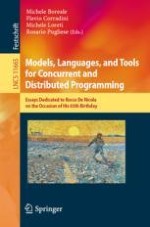This volume was published in honor of Rocco De Nicola’s 65th birthday. The Festschrift volume contains 27 papers written by close collaborators and friends of Rocco De Nicola and was presented to Rocco on the 1st of July 2019 during a two-day symposium held in Lucca, Italy.
The papers present many research ideas that have been influenced by Rocco's work. They testify his intellectual curiosity, versatility and tireless research activity, and provide an overview of further developments to come. The volume consists of six sections. The first one contains a laudation illustrating the distinguished career and the main scientific contributions by Rocco and a witness of working experiences with Rocco. The remaining five sections comprise scientific papers related to specific research interests of Rocco and are ordered according to his scientific evolution: Observational Semantics; Logics and Types; Coordination Models and Languages; Distributed Systems Modelling; Security.
